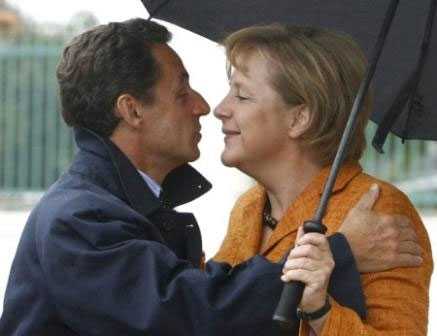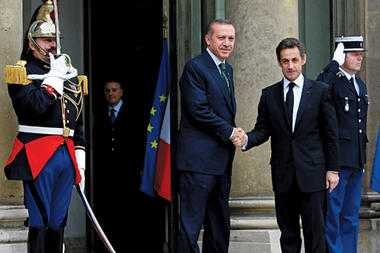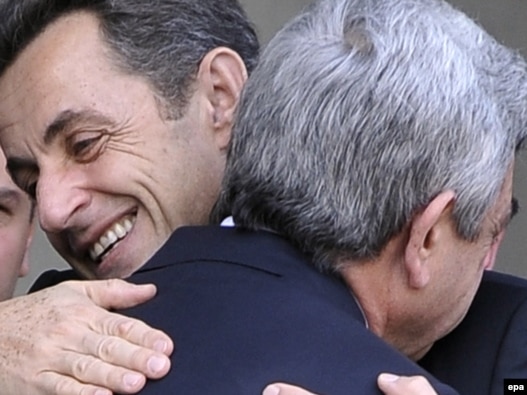 British Prime Minister David Cameron (left) with Turkish Prime Minister Tayyip Erdogan in Ankara on July 26
British Prime Minister David Cameron (left) with Turkish Prime Minister Tayyip Erdogan in Ankara on July 26
Speaking in the Turkish capital, Ankara, Cameron said he “passionately” supported Turkey’s EU membership and said opponents were guilty of double standards because they were happy to accept its contributions to Europe’s defense as a member of NATO.
“When I think about what Turkey has done to defend Europe as a NATO ally and what Turkey is doing now in Afghanistan alongside European allies, it makes me angry that your progress towards EU membership can be frustrated in the way it has been,” he told a meeting of the Turkish chambers of commerce. “I believe it’s just wrong to say Turkey can guard the camp but not be allowed to sit inside the tent.”

Cameron called Turkey” a great NATO ally” that “shares our determination to fight terrorism in all its forms, whether from Al-Qaeda or from the PKK [Kurdistan Workers Party].”
While Cameron’s remarks — on his first official visit to Turkey — echoed the support of Britain’s previous Labour government for Turkish EU membership, they were striking in their vehemence. They also represented a direct challenge to France and Germany, both of which oppose the majority Muslim country’s entry even though it formally opened membership negotiations in 2005. Since then, the pace of Turkey’s application has floundered, with just 13 of 35 chapters of European law required for membership opened.
Doing De Gaulle Proud
French President Nicolas Sarkozy and German Chancellor Angela Merkel have tried to assuage Turkish aspirations by offering it “privileged partnership” status — a designation Turkey rejects.
Germany’s opposition was reiterated on July 27 by Foreign Minister Guido Westerwelle, who was also visiting Turkey but said it was not “ready to join” the EU.
“If the question had to be decided today, Turkey would not be ready for membership and the EU would not be ready to absorb it,” Westerwelle told the German newspaper “Bild.” “But we have a big interest in Turkey turning in Europe’s direction. I want a Turkey that is on Europe’s side. Not just for economic reasons. The country can also provide very constructive help in resolving many conflicts.”
Sarkozy has justified his opposition to Turkish membership by citing cultural differences and saying it would pose a threat to the bloc’s political cohesion.
But Cameron brazenly ruffled French feathers by comparing Paris’s position to President Charles de Gaulle’s hostility to British membership in the 1960s.
“Do you know who said, ‘Here is a country which is not European. Its history, its geography, its economy, its agriculture and the character of its people — admirable people though they are — all point in a different direction. This is a country which cannot, despite what it claims and perhaps even believes, be a full member’?” Cameron asked. “It might sound like some Europeans describing Turkey, but it was actually General de Gaulle describing the UK before vetoing our EU accession. We know what it’s like to be shut out of the club. But we also know that these things can change.”
Useful Friend
He also attacked opponents of Turkish entry on the grounds of its Muslim population as being guilty of seeing “the history of the world through the prism of a clash of civilizations.” He added: “They think Turkey has to choose between East and West and that choosing both is not an option.”
Turkey’s growing economic power meant that the Europe could not turn its back on it, Cameron suggested.
“Which European country grew at 11 percent at the start of this year? Which European country will be the second-fastest-growing economy in the world by 2017? Which country in Europe has more young people than any of the 27 countries of the European Union? Which country in Europe is our No. 1 manufacturer of televisions and second only to China in the world in construction and in contracting?
“Tabii ki Turkiye,” he said, Turkish for “Turkey, of course.”
He also said Turkey was vital to resolving the dispute over Iran’s nuclear program, which Tehran claims is for peaceful purposes but which the West suspects is for bomb-making.
“Which European country could have the greatest chance of persuading Iran to change course on its nuclear policy?” Cameron asked. “Of course, it’s Turkey. It’s Turkey that can help us stop Iran from getting the bomb.”
Turkey, along with Brazil, reached an agreement with Iran in May to export 1,200 kilograms of low-enriched uranium in exchange for nuclear fuel for a medical reactor in Tehran. The agreement failed to prevent a fourth round of UN sanctions against Iran, together with further EU and U.S. embargoes. But Cameron said he hoped the deal could help “see Iran move in the right direction.”
Not So Simple
Cameron also urged Turkey to repair its tattered relations with Israel after the recent confrontation over a commando raid on an aid flotilla bound for Gaza, resulting in the deaths of nine Turkish citizens.
“No other country has the same potential to build understanding between Israel and the Arab world,” Cameron said, acknowledging Turkey’s potential to act as a bridge between East and West. “I urge Turkey — and Israel — not to give up on that friendship.” But he also appeared to side with Turkish sentiments over Gaza, saying: The situation in Gaza has to change. Humanitarian goods and people must flow in both directions. Gaza cannot and must not be allowed to remain a prison camp.”
His comments appeared to reflect the belief of many Western policymakers that Turkey’s recent hostility toward Israel may have been partly fueled by its feelings of rejection by the EU and a resulting need to foster alternative alliances in the east, including with Iran.
U.S. President Barack Obama and Defense Secretary Robert Gates have both suggested in recent remarks that the EU has driven Turkey away from the West. .”If they do not feel part of the European family, then obviously they’re going to look elsewhere for alliances and affiliations,” Obama told the Italian newspaper, “Corriere Della Sera,” this month.
However, Turkey’s EU critics complain that an internal domestic reform process needed for membership has slowed. They also cite Turkey’s failure to open its ports to goods from Cyprus, an EU member that Ankara refuses to recognize because of its division into Greek and Turkish sectors.







 France — President Nicolas Sarkozy (L) bids farewell to his Armenian counterpart Serzh Sarkisian at Elysee Palace in Paris, 10Mar2010
France — President Nicolas Sarkozy (L) bids farewell to his Armenian counterpart Serzh Sarkisian at Elysee Palace in Paris, 10Mar2010
